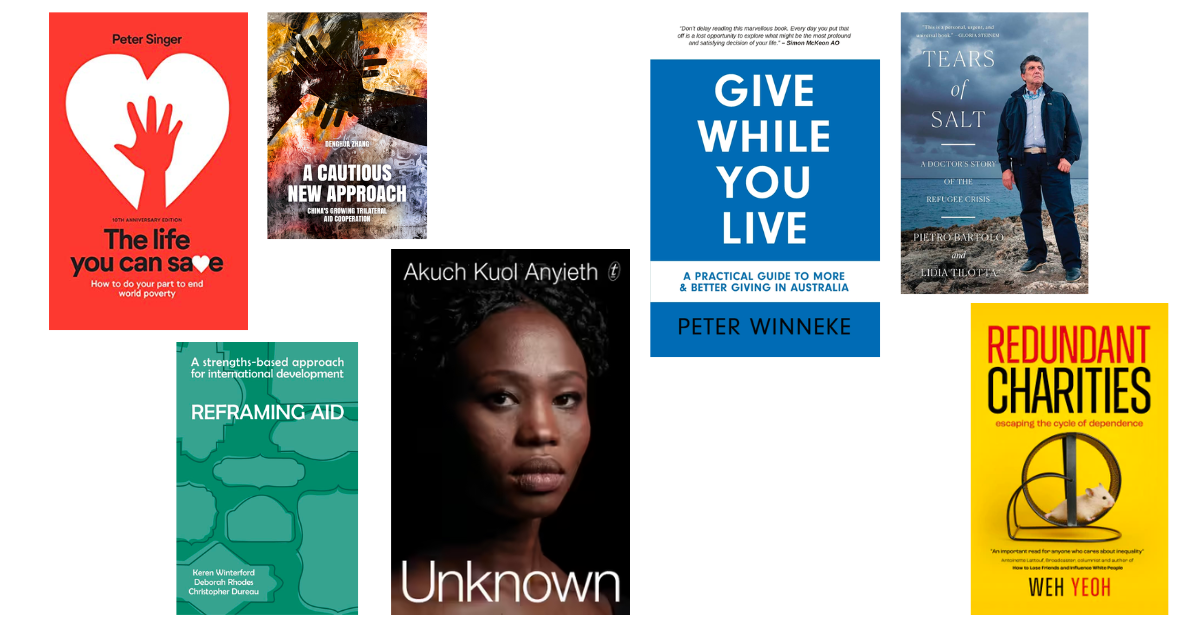‘Unknown’ by Akuch Kuol Anyieth
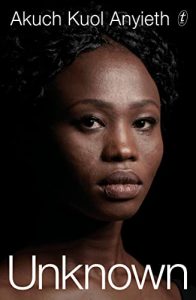 Both Emily Umbers, AIDN’s Marketing & Operations Manager, and Anna Demant, AIDN Advisory Committee Member, recommend ‘Unknown’ by Akuch Kuol Anyieth – a compelling story about a young girl’s escape, with her family, from war-torn South Sudan to Kakuma Refugee Camp in Kenya, and then to Australia.
Both Emily Umbers, AIDN’s Marketing & Operations Manager, and Anna Demant, AIDN Advisory Committee Member, recommend ‘Unknown’ by Akuch Kuol Anyieth – a compelling story about a young girl’s escape, with her family, from war-torn South Sudan to Kakuma Refugee Camp in Kenya, and then to Australia.
”Unknown is one woman’s clear and profound story about the importance of community in a world of suffering. Akuch was born in South Sudan, spent much of her childhood in Kukuma refugee camp in Kenya and settled in Australia.
It’s also an incredibly important work, giving insight into exactly how people survive in refugee camps and how settlement can come with fresh horrors. You would think that anyone surviving war, hunger and disease would only have good things to tell about a new life in a country like Australia but this is sadly not the case. This book should be compulsory reading for anyone who has any contact with people fleeing conflict and hunger” – Anna.
‘Give While You Live, a practical guide to more & better giving in Australia’ by Peter Winneke
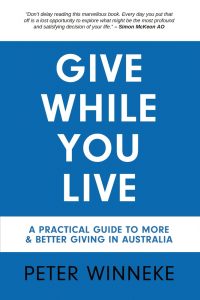 AIDNs Co-Founder, Mark Cubit, recommends Peter Winneke’s new book: “Give While You Live, a practical guide to more & better giving in Australia”.
AIDNs Co-Founder, Mark Cubit, recommends Peter Winneke’s new book: “Give While You Live, a practical guide to more & better giving in Australia”.
Peter has 20 years’ experience in the philanthropic sector, including founding the philanthropic services team at The Myer Family Office where he established over 100 foundations and then being Yajilarra Trust’s CEO for over 5 years.
He asks the reader to consider how much purpose they have in life, and how much is enough and how much do the kids need? He then discusses the super-powers of philanthropy, best practice giving, with really interesting case studies, before providing a constructive critique of the sector in Australia and the reforms required to get to much more and much better giving in this country.
“Frank, constructive with a touch of humour. This book is much needed and will stir the pot” – Mark.
‘Tears of Salt: A Doctor’s Story of the Refugee Crisis’ by Pietro Bartolo and Lidia Tilotta
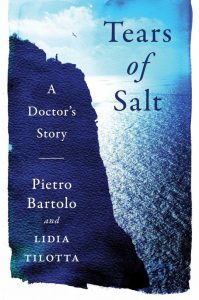 Upenyu Mawande (Uppi), AIDN Advisory Committee member and Head of Programs for the Africa Portfolio at the Judith Neilson Foundation, recommends: “Tears of Salt: A Doctor’s Story of the Refugee Crisis” by Pietro Bartolo and Lidia Tilotta.
Upenyu Mawande (Uppi), AIDN Advisory Committee member and Head of Programs for the Africa Portfolio at the Judith Neilson Foundation, recommends: “Tears of Salt: A Doctor’s Story of the Refugee Crisis” by Pietro Bartolo and Lidia Tilotta.
Situated more than one hundred miles off Italy’s southern coast, the rocky island of Lampedusa has hit world headlines in recent years as the first port of call for hundreds of thousands of African and Middle Eastern refugees fleeing civil war and terrorism and hoping to make a new life in Europe. Dr. Pietro Bartolo, who runs the lone medical clinic on the island, has been caring for many of them—both the living and the dead—for a quarter century.
“This book – read in small bite size pieces because that is all I could muster- brought the human story to the fore, opening my eyes to the courage and commitment of both humanitarians and those who chose to leave home to forge a new life, breaking my heart and reminding me what we do this all for. People” – Uppi.
‘Redundant Charities’ by Weh Yeoh
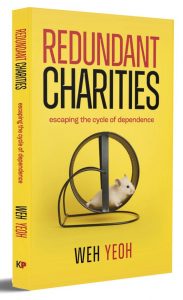 Our friend Luke Sypkes from the Radiata Foundation believes Redundant Charities by Weh Yeoh is a must-read for anyone who believes success in not-for-profits means doing themselves out of the job.
Our friend Luke Sypkes from the Radiata Foundation believes Redundant Charities by Weh Yeoh is a must-read for anyone who believes success in not-for-profits means doing themselves out of the job.
Most charities aren’t geared to ever stop. They’re geared to continue. But, in a number of grassroots charities, change is afoot. These are charities that defy normal industry limitations by setting end goals and clear exit strategies.
In this book, Weh Yeoh builds on his experience working globally with international and grassroots charities. This book is for those looking for a new approach to charity work. An approach that starts by recognising that a successful charity is one that makes themselves redundant.
“Weh does a great job exploring how charities can focus on making themselves redundant, rather than creating dependency.” – Luke.
‘A Strengths-based Approach for International Development: Reframing Aid’ by Keren Winterford, Deborah Rhodes and Christopher Dureau.
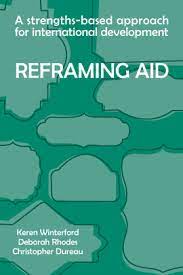 Marc Purcell, CEO of ACFID and AIDN Advisory Committee Member, recommends Keren Winterford, Deborah Rhodes and Christopher Dureau’s newly released ‘A Strengths-based Approach for International Development: Reframing Aid”.
Marc Purcell, CEO of ACFID and AIDN Advisory Committee Member, recommends Keren Winterford, Deborah Rhodes and Christopher Dureau’s newly released ‘A Strengths-based Approach for International Development: Reframing Aid”.
The core premise of the text is that there is a need for a shift from a deficit or problem-solving approach to a strengths-based approach in international development. A strengths-based approach aims to reveal assets, strengths or what is working within an individual, group, community or organisation, then uses these strengths as a way to achieve change and preferred futures. This book sets out the thinking, practical action and evidence-base to inform a sector-wide transformation.
“A valuable contribution to development practice by highly experienced practitioners” – Marc.
‘A Cautious New Approach: China’s Growing Trilateral Aid Cooperation‘ by Denghua Zhang
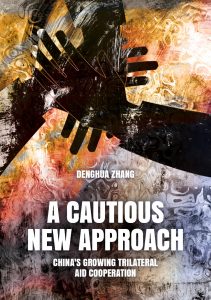 Hannah McNicol, AIDN’s Communications & Research Lead recommends Dr. Denghua Zhang’s ‘A Cautious New Approach: China’s Growing Trilateral Aid Cooperation‘.
Hannah McNicol, AIDN’s Communications & Research Lead recommends Dr. Denghua Zhang’s ‘A Cautious New Approach: China’s Growing Trilateral Aid Cooperation‘.
As a student of international relations and a former diplomat, Zhang brings the insights of a practitioner and the eye of a scholar to explain why Chinese actors choose to engage in aid cooperation with traditional donors in the Asia-Pacific. This book is among the first to take a holistic approach to understanding the motivations of the many agencies involved in China’s aid program, and it will challenge the expectations of many readers.
“I recommend this book for those interested in learning more about China’s increasing presence as a major aid and development player. In particular, Zhang explores the under-researched policy and practice of China’s trilateral cooperation with traditional donor states and UN agencies” – Hannah.
‘The Life You Can Save’ by Peter Singer
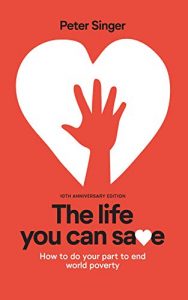 Anna Demant, AIDN Advisory Committee Member, recommends Peter Singer’s The Life You Can Save.
Anna Demant, AIDN Advisory Committee Member, recommends Peter Singer’s The Life You Can Save.
Philosopher Peter Singer’s “The Life You Can Save” is an important text about the morality of giving when we have enough, and how inaction is also in itself a morally deficient choice.
Anna notes that she particularly appreciates his take on climate action:
‘(Through climate change) the industrialised nations have harmed, and are continuing to harm, the poorer and more vulnerable nations. In a world that has no more capacity to absorb greenhouse gases without the consequence of damaging climate change, the philosophy of ‘You leave me alone, and I’ll leave you alone’ has become almost impossible to live by, for it requires ceasing to put any more greenhouse gases into the atmosphere. Otherwise, we simply are not leaving others alone.’ – Peter Singer.
